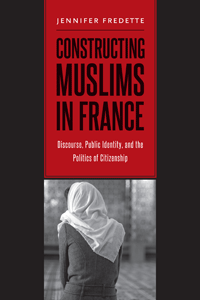Key words: France, French Muslim, Modern State, Republicanism, identity, immigrants, refugee
Jennifer Fredette analyzes the construction of Muslim citizenship in France by examining the discourses surrounding Muslim identity – primarily by elites and by Muslims themselves. Drawing on studies by Ange Marie Hancock and Kathleen Moore on post 9/11 Muslim identity formation in the United States, Fredette correlates power politics and citizenship—with the elites, primarily bureaucrats and the media, framing Muslims as the “radical Other” (8). The book locates Muslims as a heterogeneous category marked by diverse class locations and socio-political orientations. This is significant as former studies on Muslims in France have centered primarily on religiosity, locating Muslims as a homogenous social group. The first chapter problematizes the idea of citizenship and rights discourse in modern secular societies and discusses the “paradoxes of modern citizenship” (5) which involves the construction of a normative citizen and its ‘Other’- hence embodying a principle of exclusion. Drawing on Joan Wallach Scott, Fredette regards the French idea of citizenship as centered on masculinity, cultural singularity, and irrelegiosity—with the Muslims and immigrants becoming the religious and sexual aberrants. The French model of citizenship revolves around “difference-blind cultural republicanism” (154) which frames the normative culture as French and an exclusive model of equality overlooking class, race and gendered identities. Fredette, through a series of interviews, traces the discursive formations of Muslim identity centered on education, employment and housing for Muslims in France.
Chapter 4 and 5 discusses the education and employment of French Muslims. The presiding narrative on Muslim education is centered upon religiosity and an anxiety over the hijab—with scarce attention paid to the inequities Muslims face in the education and employment sector. Fredette regards schools as a replica of the state which plays a cardinal role in modeling the ‘ideal French citizen’- marked by its exclusionary nature and overlooking of racial, ethnic and gendered identities. The exclusionary nature of state institutions is not solely a Muslim crisis and is shared by immigrants and working class French citizens. The elite discourse, Fredette says, has framed Muslims as “dangerous employees” (107) with the bureaucrats paralleling Muslim employment to Islamization of French society. The diverse experientiality and privilege locations among French Muslims in response to Fredette’s interview is significant – with white Muslims narrating a significant lack of discrimination as compared to Arab men who are often vilified in public discourses.
The spatiality of French Muslims as a territorial and psychic coordinate is central to this study with the housing and spatial location affecting the experientiality of being a Muslim in France. Tracing the historicity of Muslim housing in France, Fredette notes how the everydayness of Muslims are linked to narratives of violence and riots in the suburbs and the emergence of fundamentalist Islam. The idea of a Muslim space is shifted to be a “radicalized, ethnic, religious danger” influenced by “macho/basement Islam” (130). Ghettoization of Muslim communities has profound underpinnings socially and economically – with poorly maintained buildings and rampant rise of unemployment in the suburbs. Intersectionality and locating structural iniquity of Muslims demarcates Fredette’s study- for instance, on locating the spatial segregation of Muslims, she brings in the predicament of immigrant North African women and the gendered nature of cultural, linguistic and economic inequity.
Extending her analysis to the French model of citizenship, Fredette in the concluding chapter engages in a critique of the multiple models of republicanism. Fredette extends Scott’s critique of the modern democratic state and its racial, ethnic and gendered othering to the elite/public discourses on French citizenship. The republican model is portrayed as “difference-blind” (154) – similar to color blind racial politics in the US – overlooking racial, ethnic and gendered hardships of immigrants and hence invisibilising structural and cultural inequity. Public discourse on French Muslims depends primarily on narratives by French elites on Muslim religiosity and homogeneity. These meaning makings on Muslims are in short of oppositional claims due to “cultural and institutional” barriers and “centralized nature of French Politics” (159). Cardinal in Fredette’s study is her analysis of the lack of a shared counter narrative among Muslims – with multiple Muslims in her ethnographic interview embracing French republicanism while many others struggling with the hybrid identities of being French and a Muslim.
With xenophobia and anti-immigrant narratives gaining currency is Europe and elsewhere, Fredette’s study is extremely pertinent in its unraveling of the bleak underbellies of republicanism, democracy and the modern nation state in itself. Rightly locating the anti-Muslim discourse as a narrative and affirmative ideology in France, what earmarks Fredette’s study is her intersectional positionality – addressing simultaneously race, gender and ethnic locations of immigrants. Breaking through the homogeneity of official claims on Muslim religiosity, Fredette has moved beyond – with the interviewees at times appropriating or even negating their hybrid identities.
Works Cited
Hancock, Ange- Marie. 2004. The politics of disgust: The public identity of the welfare queen. New York: New York University Press.
Moore, Kathleen. 2010. The unfamiliar abode: Islamic law in the United States and Britain. New York: Oxford University Press.
Scott, Joan Wallach. 2005. Parité! Sexual equality and the crisis of French universalism. Chicago: University of Chicago Press
© 2019 Simi K. Salim

